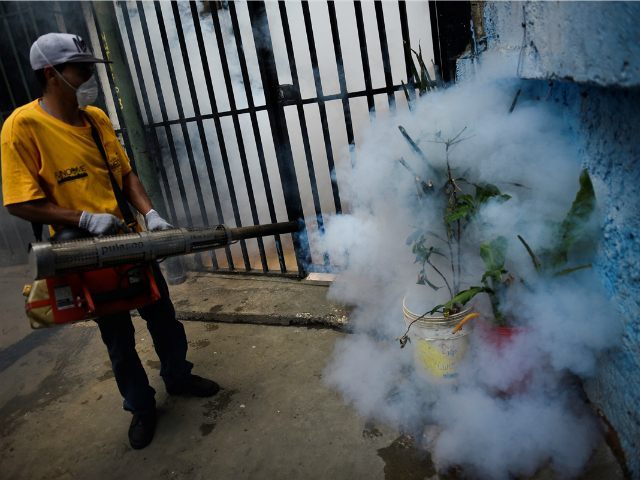Microcephaly, babies born with small heads and underdeveloped brains, is one of the grim consequences that has been laid at the feet of the Zika viral outbreak.
The possible link between Zika and these birth defects is not well understood. Some critics have speculated that microcephaly is actually caused by heavy pesticide spraying in nations such as Brazil. Both Brazilian authorities and the World Health Organization have now denied there is any link between the pesticide Pyriproxyfen and microcephaly.
CNN reports that a group of Argentinian doctors advanced the claim that Pyriproxyfen — which is more specifically a larvicide, designed to kill mosquito larvae growing in potable water — might be the culprit behind the surge of microcephaly in Brazil. One Brazilian state, Rio Grande do Sul, banned the larvicide last weekend as a result.
The Argentinian doctors also criticized the Brazilian Ministry of Health for being too quick to blame Zika for the surge in birth defects.
Pyriproxyfen’s Japanese manufacturer, Sumitomo Chemical, said the accusations about its product were “totally unfounded,” pointing to its 20-year history of safe use in countries around the world.
The Brazilian Health Ministry agreed, saying there are “no epidemiological studies showing the association between the use of Pyriproxyfen and microcephaly.” The ministry further defended the tests which established the Zika linkage and noted that Zika-linked microcephaly has been reported in areas that don’t use Pyriproxyfen. One of those areas is the coastal city of Recife, considered “ground zero” of the Zika outbreak.
The World Health Organization agreed, pointing out that Pyriproxyfen is one of 12 larvicides it has officially approved for the control of mosquito populations, and concluding there is no evidence to support a link to microcephaly.
Business Insider cited the statements from Brazilian and WHO officials in response to viral Internet rumors portraying the larvicide as the true cause of the Zika-linked microcephaly epidemic. BI quotes experts saying that Pyriproxyfen interferes with hormones that do not exist in humans, is quickly flushed from animal bodies, and would have to be consumed in ridiculous volumes to become toxic in humans: the equivalent of drinking over 1,000 liters of larvicide-treated water per day.
Business Insider also observes these viral Internet memes implicate the huge Monsanto agricultural company in a conspiracy to conceal the dangers of Pyriproxifen, but Monsanto is merely a partner of the Sumitomo corporation, not its owner, and does not manufacture larvicides.
Despite these statements, the secretary of health for Rio Grande do Sul, Joao Gabbardo dos Reis, said the ban on Pryiproxyfen would remain in place. “The suspicion is enough to make us decide to suspend use. We cannot take that risk,” Gabbardo said.
That decision could have horrific results for residents of the state.
“The potential human health consequences of discouraging the use of Pyriproxyfen in drinking water storage and other mosquito-reduction programs is catastrophic, with potential deaths and serious disease from otherwise avoidable malaria, dengue and other mosquito-borne diseases numbered in at least the hundreds of thousands,” warned Australian toxicology consultant Andrew Bartholomaeus, who works with the Universities of Cnaberra and Queensland, as quoted by Business Insider.

COMMENTS
Please let us know if you're having issues with commenting.